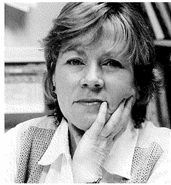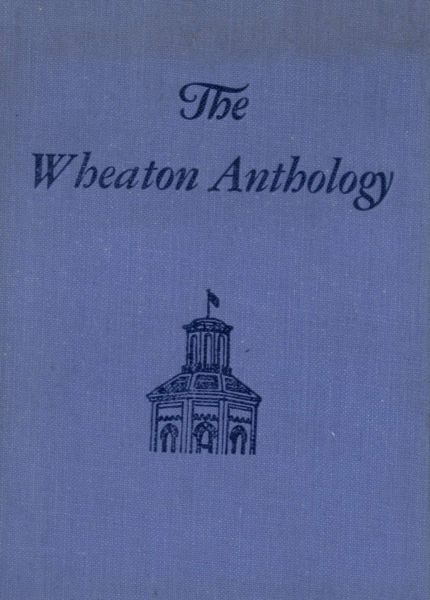 During its early decades, the Wheaton College Record, the student newspaper, published verse written by faculty and students. However, as the editors, Raymond Horton and Charles Seidenspinner, observe in their introduction, “to publish a poem in a newspaper is to bury it.” Seeking to rectify this, they scoured thousands of pages, seeking “…the best representatives of the literary talent which has appeared on the Wheaton campus.” Compiling the best of the best, they collect their choices into a book called The Wheaton Anthology, published in 1932. Brief in pages, the anthology contains a number of interesting pieces, including a poem by Jonathan Blanchard, first president of Wheaton College. Also included are poems by Elliot Coleman, who later gained renown as a poet and professor at Johns Hopkins, and Royal T. Morgan, professor of natural sciences.
During its early decades, the Wheaton College Record, the student newspaper, published verse written by faculty and students. However, as the editors, Raymond Horton and Charles Seidenspinner, observe in their introduction, “to publish a poem in a newspaper is to bury it.” Seeking to rectify this, they scoured thousands of pages, seeking “…the best representatives of the literary talent which has appeared on the Wheaton campus.” Compiling the best of the best, they collect their choices into a book called The Wheaton Anthology, published in 1932. Brief in pages, the anthology contains a number of interesting pieces, including a poem by Jonathan Blanchard, first president of Wheaton College. Also included are poems by Elliot Coleman, who later gained renown as a poet and professor at Johns Hopkins, and Royal T. Morgan, professor of natural sciences.
Category Archives: Wheaton College Archives
Children of Two Adams
by Laura Miguelez ’83
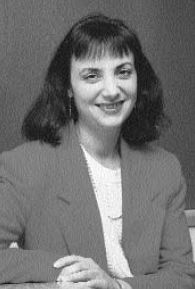 One of the most striking parallels the apostle Paul comments upon in Scripture is that of the First and Last Adam. The first Adam was to be the exemplar of all that is good in a humanity made in God’s image. Yet as Adam and Eve, who had only known good, chose to know evil in disobedience to their Creator, so follow we.
One of the most striking parallels the apostle Paul comments upon in Scripture is that of the First and Last Adam. The first Adam was to be the exemplar of all that is good in a humanity made in God’s image. Yet as Adam and Eve, who had only known good, chose to know evil in disobedience to their Creator, so follow we.
We, too, determine that God’s ways cannot be best and so choose to go our own ways. Nor do we see this condition as being problematic. When confronted with our failure to do good, we stand behind our first parents, claiming, “I’m only human”– claiming, that is, that we expect to fail in our quest to image a holy God.
Nor do we see how grievous this low expectation can be. We distance ourselves even more from our choices and speak of learning to “love the sinner” and “hate the sin” as though we were somehow capable of separating the two, not acknowledging that sin arises from the very inclination of our hearts. Sin is not ever disembodied “out there” somewhere, but exists in the context of the person committing it.
The only reality is that of the sinning sinner, and this is why Christ’s sacrifice is so pivotal: He died not for sin, but for sinners who could not keep themselves from sinning. We are children of the first Adam, a living being; children of dust. Yet we are called to be children of the last Adam, Jesus Christ, a life-giving spirit; children of heaven.
Jesus Christ–not Adam–is the one who defines for us what it means to be human. He chose to love the sinning sinner by dying on our behalf that we might know the love of God at work in our hearts by His cleansing Holy Spirit.
The basis of our being accepted before God does not change once we commit our lives to Him. We can come before God’s presence only because of what Christ has accomplished; we can remain in God’s presence only on the basis of the same.
And this is the great tension we feel in our earthly sojourn: that in God’s sight, as Martin Luther observed, we are at one and the same time both righteous–by Christ’s nature within us–and sinners–by our own nature. And although we continue to seek to
hide behind our human nature in explaining ourselves to ourselves, the reality is that Christ is the one to whom we should return. And this we will not do unless we understand ourselves to be sinning sinners.
Only we who are sick have need of a physician, and so we are told by Christ to “Go and learn what this means, ‘I desire mercy, and not sacrifice’ For I came not to call the righteous, but sinners” (Matt. 9:12-13).
And herein lies our hope: “Therefore, my beloved brethren, be steadfast, immovable, always abounding in the work of the Lord, knowing that in the Lord your labor is not in vain” (1 Cor. 15:58).
—–
Twenty years ago, the Wheaton Alumni magazine began a series of articles, titled “On My Mind”, in which Wheaton faculty told about their thinking, their research, or their favorite books and people. Former Assistant Professor of Theology, Laura Miguelez ’83 (who has taught at Wheaton since 1998) was featured in the Autumn 2000 issue
First Ladies of Wheaton College
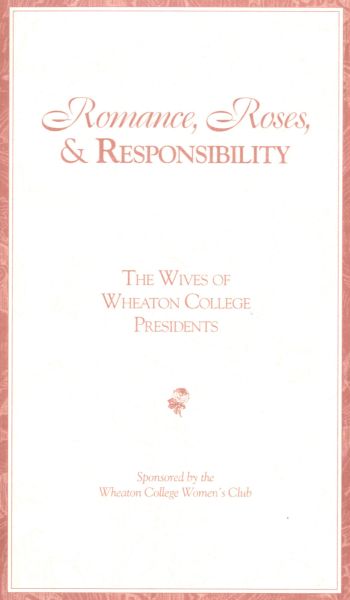 The presidents of Wheaton College are lauded for their leadership, guiding the institution through the decades, holding close its motto, “For Christ and His Kingdom.” But leadership is usually a partnership; and surely every man would respectfully defer to the invaluable contribution of his wife. Ruth Cording, former archivist at Wheaton College, composed a booklet, Romance, Roses and Responsibility, celebrating the lives of these faithful women. Cording profiles the following: 1. Mary Blanchard, wife of founder Jonathan Blanchard. 2. Margaret Ellen Milligan, first wife of second president Charles Blanchard, who died during her early motherhood. 3. Amanda Jane Carothers, second wife of Charles Blanchard, died from scarlet fever. 4. Frances Carothers, third wife of Charles Blanchard, who was a physician and wrote a biography of her husband. 5. Helen Spaulding Buswell, wife of J. Oliver Buswell, third president of Wheaton College. 6. Edith Olson, wife of V. Raymond Edman, fourth president. 7. Miriam Bailey, wife of Hudson Armerding, fifth president. 8. Mary Sutherland, wife of Richard Chase, sixth president. 9. Sherri Elizabeth, wife of Duane Litfin, seventh president.
The presidents of Wheaton College are lauded for their leadership, guiding the institution through the decades, holding close its motto, “For Christ and His Kingdom.” But leadership is usually a partnership; and surely every man would respectfully defer to the invaluable contribution of his wife. Ruth Cording, former archivist at Wheaton College, composed a booklet, Romance, Roses and Responsibility, celebrating the lives of these faithful women. Cording profiles the following: 1. Mary Blanchard, wife of founder Jonathan Blanchard. 2. Margaret Ellen Milligan, first wife of second president Charles Blanchard, who died during her early motherhood. 3. Amanda Jane Carothers, second wife of Charles Blanchard, died from scarlet fever. 4. Frances Carothers, third wife of Charles Blanchard, who was a physician and wrote a biography of her husband. 5. Helen Spaulding Buswell, wife of J. Oliver Buswell, third president of Wheaton College. 6. Edith Olson, wife of V. Raymond Edman, fourth president. 7. Miriam Bailey, wife of Hudson Armerding, fifth president. 8. Mary Sutherland, wife of Richard Chase, sixth president. 9. Sherri Elizabeth, wife of Duane Litfin, seventh president.
Commenting on her use of the rose motif, Cording writes:
Mary Blanchard brought her roses from Cincinnati when she and her husband, Jonathan, Wheaton’s first president, came to Knox College in 1845. Those rose bushes were then transplanted to their home on South President Street when the Blanchards moved to Wheaton, In 1863 the bushes were moved to the college and planted in front of Blanchard Hall near the east door. Some of the bushes were also planted, at the request of Jonathan Blanchard’s granddaughter, Geraldine Kellogg Dresser, and when she died, former president V. Raymond Edman referred to the “heritage of roses,” stating that she “passed the Blanchard heritage to us with roses.” In 1984 I noticed that the roses in front of Blanchard Hall were just about ready to go into pink bloom, but that the remodeling of the front of Blanchard would threaten their blossoms. The college gardener was alerted and all the remaining bushes were moved to the front of Westgate, the current home of the Wheaton College Alumni Offices. They are now appropriately marked with plaques, showing that they were originally brought to Wheaton by Mary Bent Blanchard – 150 years ago!
The Orange and the Blue
Like any campus, Wheaton College proudly displays its colors. Orange and blue. Visiting, you will encounter orange and blue t-shirts, pennants, banners, posters, jackets, flags, blankets; and, during athletic events, energetic, noisy fans displaying bright orange and blue facepaint. Why these colors?  The origin dates to Jonathan Blanchard, the founder of the school. Historian W. Wyeth Willard writes in Fire on the Prairie – The Story of Wheaton College:
The origin dates to Jonathan Blanchard, the founder of the school. Historian W. Wyeth Willard writes in Fire on the Prairie – The Story of Wheaton College:
Like his parents and all true New Englanders [Charles Blanchard] was proud of his ancestry. “My father and mother were Vermonters. There can be no better blood; it seems to me, than that of the English Pilgrims and Puritans.” In many of the Blanchards’ published addresses this note comes out time and again, along with mention of Plymouth Rock. But that did not prevent the Blanchards from admiring people of other ancestries. Jonathan wrote concerning the Swedes, “the merging of northern steel with Anglo-Saxon iron.” And he suggested that the College colors be orange and blue — orange after that great Dutch patriot, William of Orange, and blue for loyalty.
Identity
Twenty years ago, the Wheaton Alumni magazine began a series of articles, titled “On My Mind”, in which Wheaton faculty told about their thinking, their research, or their favorite books and people. Former Assistant Professor of New Testament Studies Nancy L. Calvert (who taught at Wheaton from 1990-1997) was featured in the Spring 1996 issue.
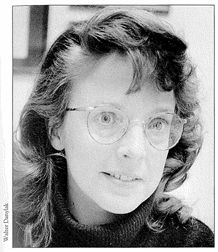 Come late June, I’ll be getting married. It’s a big step, and I’m taking it later in life than most. David, my fiance, and I are glad to have found each other. We sense God’s timing in bringing us together in the midst of our busy lives and careers.
Come late June, I’ll be getting married. It’s a big step, and I’m taking it later in life than most. David, my fiance, and I are glad to have found each other. We sense God’s timing in bringing us together in the midst of our busy lives and careers.
Yet each of us finds that we harbor some fearfulness about joining our lives. We have each established personal and professional identities. Getting married will involve sacrifice–but how much of our respective identities are at stake?
My approaching marriage has prompted me to examine the source of my identity more closely. I imagine that I am not alone when I admit that the person I have become is partially a result of my seeking the approval of others.
By taking on characteristics, however, that are deemed important by another person, or by performing according to someone else’s perceived standard, it is as if you and I believe that we are valued only if we can somehow earn another’s respect and love.
If this approval-based mindset is central to our identity, it can render us oblivious to the wonder of how God created us and to his purpose for our lives. It allows others to gain control of our lives–a control that ultimately belongs to God. In his book, A Pretty Good Person, Lewis Smedes wisely states, “One way to get in control of one’s life is surrender to unconditional love…I have to get back to that surrender now and then or I lose control again to the demon of other people’s approval” (p. 110). If our identity depends on others’ approval and not on God’s unconditional love, chances are that we will never fully discover what makes us able to serve God in our unique way.
Another source of self-identity is our life experiences. Yet at times, our experiences can become like prisons. It may be too threatening to actually discern what in our past shackled us to a certain perception of our world, ourselves, or God. But unless we are willing to name, evaluate, and revise the ways we perceive the world, we cannot freely embrace the life God has so graciously granted us.
In recent years, many scholars have examined the apostle Paul’s call to preach to Gentiles (one example is Krister Stendahl’s Paul Among Jews and Gentiles). In his providence, God gave Paul the background to succeed in his ministry to Gentiles. Paul was familiar with Hellenistic ways and philosophies, and Jewish culture and theology. He was also fortunate enough to be a Roman citizen, But in that dramatic encounter with the living Christ on the road to Damascus, Paul was blinded and his whole world turned upside down. He discovered that the very man whose followers he had been persecuting was actually the Messiah.
Once the Lord broke through his prison of misconceptions, Paul found his identity in Christ and his life’s focus in fulfilling God’s new purposes for him. He neither sought to gain the approval of devout Jews who knew him in the years before his calling, nor of those who believed that Gentile believers must take on the Mosaic law.
God may not use visions and blindness to bring us to a better understanding of his purpose for our lives. But he often uses events or people to get our attention, to help us better understand who we are and how we can serve God in our own unique way.
As David and I enter marriage, we must remember that our identities are ultimately rooted in Christ–though the counsel of others may be important. Together we must work in such a way that God can best fulfill his own unique purposes for us in the arenas of our professional and married lives. Doing so won’t be easy; we may have to expose one another’s shackling misperceptions from time to tune. Our identities will probably be remolded to some degree. But it would seem that only in this way can we even begin to find the joy of living together according to God’s loving guidance.
———-
The following statement was included at the time of publication:
Dr. Calvert is assistant professor of New Testament studies. She received her Ph.D. from the University of Sheffield, England, her M.Div. from Gordon-Conwell Theological Seminary, and her B.A. from Wheaton. She is an ordained Presbyterian minister (PCUSA) and serves as parish associate at the First Presbyterian Church of Glen Ellyn. In her spare time she likes to listen to classical music, read, watch “Frasier” and films remakes of Jane Austen novels. But mostly she corresponds with her fiance via e-mail.
What Does Our Speech Reveal?
by Dr. Edwin A. Hollatz G.S. ’55
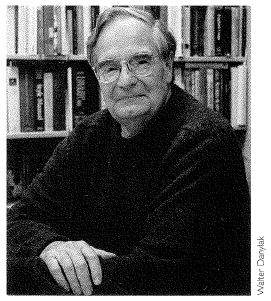 The Bible has much to say about human speech, about the way we use this wonderful gift that God has given us. This investment of creative expression through language is perhaps one dimension of the image of God imbued in the very nature of human beings, spoken of in Genesis 1-2.
The Bible has much to say about human speech, about the way we use this wonderful gift that God has given us. This investment of creative expression through language is perhaps one dimension of the image of God imbued in the very nature of human beings, spoken of in Genesis 1-2.
It is this which lifts us from the level of the dumb brute and enables us to express not only what we think and feel, but who we really are. We can conceive of anything in words and images, with limitless possibilities of fact and fantasy. The panoply of literature throughout human history gives evidence of that which is most exalted as well as most debased.
During this past Christmas season we were reminded again of God’s supreme communication to us in His Son, Jesus Christ. The Apostle John, in Chapter 1 of his Gospel, speaks of Jesus Christ as the Word of God, which became flesh–a veritable transmutation of the eternal, divine, creative Word, now come in human form. That Word, full of grace and truth, has the power to redeem us, bringing light and life so that we might receive Him and become children of God.
As new creations in Christ, what about our words? How true and clear are their statements in revealing the character of the life of a follower of Jesus Christ? Are our words an adornment to the power of the gospel of Christ?
In Matthew’s Gospel, Peter twice denied being one of Jesus’ followers, even using and oath. But others standing by said, “Surely you are one of them; for your speech betrayeth you” (Matt. 26:73 KJV).
The Book of Judges relates another incident in which one is betrayed by one’s speech. The Gileadites could distinguish an Ephraimite if he mispronounced the word “Shibboleth.” If he said “Sibboleth,” he would be seized and killed (Judg. 12:5-6).
These two episodes from Scripture vividly portray how one’s speech accent may have unfortunate consequences. But at a more significant level, the “accent” provided by our manner of living can be crucial. Around 40 B.C. the Roman Publius Syrius said, “Speech is the mirror of the soul. As a man speaks so is he.”
Some 70 years later Christ said, “Out of the abundance of the heart the mouth speaks. The good person brings good things out of a good treasure, and the evil person brings evil things out of an evil treasure. I tell you, on the day of judgment you will have to give an account for every careless word you utter; for by your words you will be justified, and by your words you will be condemned” (Matt. 12:34-37, NRSV).
The Apostle Paul warns us, “Do not let any unwholesome talk come out of your mouths, but only what is helpful for building others up accordmg to their needs, that it may benefit those who listen” (Eph. 4:29, 31-32, NIV).
May the eloquent words of the old Anglican hymn be true of us as gifted human beings, created in the image of God:
God be in my heart,
and in my thinking;
God be in my head,
and in my understanding;
God be in my mouth,
and in my speaking.
———-
Twenty years ago, the Wheaton Alumni magazine began a series of articles, titled “On My Mind”, in which Wheaton faculty told about their thinking, their research, or their favorite books and people. Former Professor of Communications Emeritus, Edwin A. Hollatz ’55 (who taught at Wheaton from 1954-2000) was featured in the Winter 1998 issue.
Having worked at the College since 1955, Dr. Edwin A. Hollatz has taught speech, coached award-winning debate teams, served as faculty advisor to WETN radio, and helped establish the theater program. He has held offices in professional organizations, authored numerous journal articles, and been chosen for membership in several honorary societies. Dr. Hollatz is a frequent speaker at Wheaton Club meetings and received the Alumni Association’s 1993 Distinguished Service to Alma Mater Award. He and his wife, Joanne Simon Hollatz ’55, whom he met when Joanne joined Wheaton’s faculty, held their wedding reception in the Memorial Student Center. They are the parents of Cheryl Hollatz-Wisely ’85 and Celia Hollatz Bergman ’87.
Wheaton College and Global Warming
Oak Park, Illinois, located eight miles west of the Chicago Loop, is the home of notable contributors to national and world culture. For example, here lived novelist Ernest Hemingway, as did Edgar Rice Burroughs, creator of Tarzan and John Carter of Mars. Architect Frank Lloyd Wright designed several of his famous structures at his Oak Park studio; and James Dewar, inventor of the late, lamented Twinkie, resided amid the solace of its tree-lined avenues. Oak Park is also the childhood home of Dr. Wallace Broecker, who coined the now-ubiquitous phrase “global warming” in a 1975 essay titled “Climate Change: Are we on the brink of a pronounced global warming?”
As a child, Broecker attended Harrison Street church in Oak Park with his parents. The small assembly was led by T. Leonard Lewis, who would later serve as pastor of First Baptist Church of Hammond, Indiana, before serving as president of Gordon-Conwell Seminary in Masschussetts until his death in 1959.
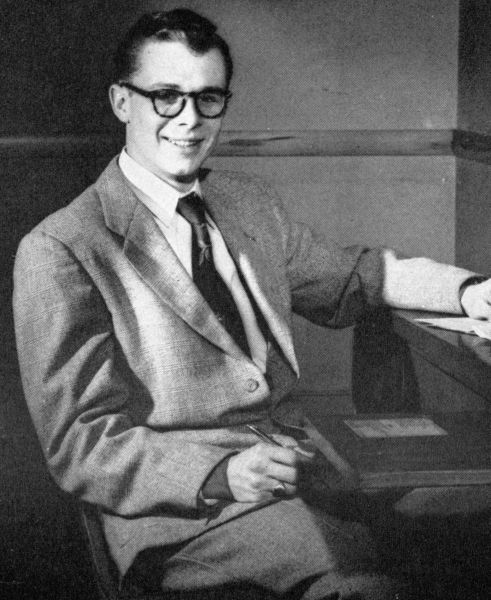 Broecker, encouraged to attend Wheaton College because his neighborhood friend, “Ernie” Sandeen, enrolled, recalls campus mischief in Fixing Climate: What Past Climate Changes Reveal About the Current Threat – And How to Counter It (2008), written with Robert Kunzig:
Broecker, encouraged to attend Wheaton College because his neighborhood friend, “Ernie” Sandeen, enrolled, recalls campus mischief in Fixing Climate: What Past Climate Changes Reveal About the Current Threat – And How to Counter It (2008), written with Robert Kunzig:
It has a reputation as the Harvard of evangelical colleges, an ambitious but also a godly place, where students signed a pledge to adhere to the same set of rules that applied to Harrison Street…It was a serious place…and it seemed to force into full flower the most profoundly unserious aspect of Broecker’s character, one that can still be startling today to the uninitiated…At Wheaton the pranks got more elaborate. In his junior year he was business manager of the yearbook, which position of influence allowed him to sign excuses that got him and his friends out of daily chapel. It also got him a key to the attic of Blanchard Hall, where college memorabilia was stored. That October, Broecker discovered an unused door leading from the attic into the bell tower, which was off-limits to students; the custodian kept the main entrance carefully padlocked. At midnight on Halloween night Broecker, Sandeen and their roommates woke the campus with a loud tolling. When the custodian came racing into the bell tower, they exited through the attic and locked him in. He was forced to ring the bells again to summon the police. By the time the law arrived the Broecker gang had retreated to a ground-floor classroom. Broecker remembers vividly the flashlight beams coming through the windows and playing along the walls as he and his friends hugged the floor, out of sight.
Broecker offers an interesting perspective on the 1951 revival…and his subsequent drift from Evangelical Christianity:
In addition to going to chapel every day, Wheaton students were required to spend a week every year rededicating themselves to Christ under the guidance of a visiting preacher. That year the event took an extraordinary turn – it became a mass public confession. For three days and nights students lined up in the choir loft and behind the pulpit, waiting for their chance to proclaim their sins. The pressure to participate was intense. Broecker sat there in turmoil, brooding more seriously than he had ever brooded over anything. He certainly had sins – violations of the Wheaton pledge, for instance, that went beyond dancing. (He has never liked dancing.) But he knew some of of the people who were confessing, and he knew they weren’t being honest. They were holding back on the juicy stuff. The hypocrisy of the whole spectacle revolted him – people were pretending to believe in rules they couldn’t really live by, and then pretending to confess their violations of those rules. Hypocrisy and dishonesty, Broecker realized, were the sins he could least abide. That day in chapel, he slipped the fragile line that had tied him to the Rock.
Moving into the field of scientific research, Broecker found a substitute:
[Science] is the belief that if we observe the world carefully, test our ideas skeptically, and communicate honestly, we can figure things out. That summer of 1952, Broecker was converted to science. In time he would come to think of it as something sacred.
Wallace S. Broecker attended Wheaton College for three years before transferring to Columbia where he graduated. He is the Newberry Professor of Earth and Environmental Sciences at Columbia University. In 2006 he received the Crafoord Prize in Geosciences.
Thankful for the Thorns
How easy it is to forget to be thankful for suffering and weakness. We are so often more thankful for the good things, the comforts in life, things that go well. But the weaknesses and sorrows ought to be received with thankfulness, for the weaknesses point us to God, reminding us of how much we need God’s amazing and sufficient grace.
Paul wrote in 2 Cor. 12:5-10 that the thorn in his side reminded him of God’s grace. What was it that would remind him of his weakness and need for God?
Paul was caught up into Paradise and heard that which no mortal is permitted to repeat. He had reason to boast, but a thorn reminded him of his particular weakness. Perhaps that thorn was the painful awareness that he had killed Christians. Living with the horror that he had murdered, especially those who loved Christ, must have been a terrible sorrow, one Paul would live with the rest of his life.
In my own life, weakness and needs have been hard to recognize and acknowledge. Suffering just was not in the script, at least the script that I wrote. God has had a different script for me, however, one that includes suffering and sorrow and reminds me of the many ways I hold onto idolatries and false supports rather than seek His holy will.
Remember the journey of Much-Afraid (Hinds’ Feet on High Places by Hannah Hurnard) as she faced her fears and began to follow the great shepherd. The first step in her journey, however, required her to take the hands of her companions, Sorrow and Suffering. Only as she journeyed with these companions would she be transformed, able to receive a new name along with the feet that would enable her to prance on the mountain with the shepherd. Through many trials and travails, Much-Afraid received new feet and a new name, Grace and Glory. Sorrow became Joy, and Suffering became Peace. How many of us look for our new names as we enter our journeys? In Rev. 2:17b, God says, “To everyone who conquers I will give some of the hidden manna, and I will give a white stone, and on the white stone is written a new name that no one knows except the one who receives it.”
One final thought comes from Henri Nouwen’s book, The Inner Voice of Love:
“The situation which brought about your pain was simply the form in which you came in touch with the human condition of suffering. Your pain is the concrete way in which you participate in the pain of humanity.
Paradoxically, therefore, healing means moving from your pain to the pain. When you keep focusing on the specific circumstances of your pain, you easily become angry, resentful, and even vindictive. You are inclined to do something about the externals of your pain in order to relieve it…But real healing comes from realizing that your own particular pain is a share in the humanity’s pain. That realization allows you to forgive your enemies and enter into a truly compassionate life.”
As I journey through this life, I hope to receive sorrows and suffering with greater thanksgiving, participating in the pain of humanity while awaiting my new name as I continue to look to God for His sufficient grace.
———-
Twenty years ago, the Wheaton Alumni magazine began a series of articles, titled “On My Mind”, in which Wheaton faculty told about their thinking, their research, or their favorite books and people. Current Associate Professor of Psychology, Cynthia Neal Kimball (on faculty since 1990) was featured in the Winter 1999 issue.
The following statement was included at the time of publication:
Dr. Cynthia Jones Neal, chair of Wheaton’s psychology department, has been at the college since 1990. She received bachelor’s, master’s and doctoral degrees from the University of New Mexico. Her work has been published in several professional journals, including Personality and Social Psychology, and Merrill-Palmer Quarterly. She also co-authored chapters in Vygotsky and Education and A New Vision for Welfare Reform and Nurture That Is Christian: Developmental Perspectives on Christian Education. Dr. Neal received Wheaton’s Junior Teacher of the Year Award in 1990.
Dr. Mal Couch
Dr. Mal Couch died on February 12, 2013, age 74. Born and raised in Dallas, attending Scofield Memorial Church where he heard such preachers as Harry Ironside, Lewis Sperry Chafer, V. Raymond Edman and Carl Armerding, perhaps it was inevitable that he would find himself immersed in dispensational theology and its accompanying prophetic emphasis. 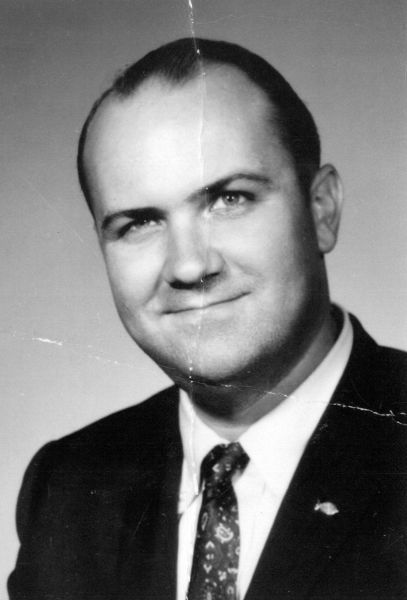 After earning his B.A. from John Brown University, he returned to his hometown where he attended Dallas Theological Seminary, earning his Th.M in Systematic Theology. Aside from ministry, he supported himself in the television and film industry, editing news broadcasts and documentaries, keeping him close to current events. On November 22, 1963, Couch, a senior at DTS, was assigned by Channel 8 to film John F. Kennedy’s fateful Dallas visit, riding in the motorcade a few cars behind the President.
After earning his B.A. from John Brown University, he returned to his hometown where he attended Dallas Theological Seminary, earning his Th.M in Systematic Theology. Aside from ministry, he supported himself in the television and film industry, editing news broadcasts and documentaries, keeping him close to current events. On November 22, 1963, Couch, a senior at DTS, was assigned by Channel 8 to film John F. Kennedy’s fateful Dallas visit, riding in the motorcade a few cars behind the President.
As shots rang out from Texas School Book Depository, he saw the rifle barrel drawn back into the sixth floor window. Couch was responsible for filming the brief footage of bystanders dropping to the grass at Dealey Plaza. His eyewitness testimony is documented in the Warren Commission. “One thing that impressed me in the days that followed the assassination of President Kennedy,” he told an interviewer, “was that so many people appeared confused and lost at that moment. They walked around the city in a daze. They had no connection with life, it seemed. For me, my personal faith in Jesus Christ and in a God who controls the affairs of men, did not change a bit. In fact, it gained deeper roots.”
Moving north to Chicagoland, he worked a part-time editor for Moody Monthly while also serving as pastor of Naperville Bible Church (now called Gracepoint Church). At his 1966 installation ceremony, the Invocation was presented by Dr. Merrill Tenney of Wheaton College; the Charge was delivered by Dr. John Walvoord, president of Dallas Theological Seminary. Busy with ministry, Couch also attended Wheaton College graduate school. “I can think of no better place for training Christians in the art of communicating the message of scripture,” he wrote on his application.
Couch taught at Philadelphia School of the Bible, Moody Bible Institute and Dallas Theological Seminary, specializing in the fields of systematic theology, history, Biblical Hebrew and New Testament Greek. Recently, he was president of Scofield Ministries in Clifton, TX and Pastor of Clifton Bible Church.
A man of many abilities, Mal Couch was a photographer, radio talk show host and a licensed pilot. Using his directing and editing skills, he produced The Occult with Hal Lindsay, The Temple with Zola Levitt and Someone Cares with Charles Colson. He was also a prolific writer, including Inerrancy, Titus and the Birth of the Nation of Israel. One of his final titles was Going Home: Our Blessed Hope of Heaven and Eternity, written with his wife, Lacy.
Two Hopes
Twenty years ago, the Wheaton Alumni magazine began a series of articles, titled “On My Mind”, in which Wheaton faculty told about their thinking, their research, or their favorite books and people. Former Professor of Education Richard Turner (who taught at Wheaton from 1981-1994) was featured in the Winter 1994 issue.
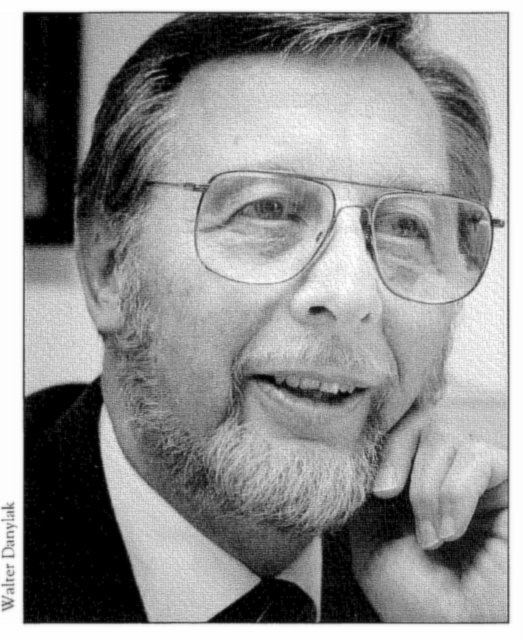 It was as a high school student that I first heard of Wheaton College. In a magazine called Christian Life and Times I found articles written by people from all walks of life–pastors, housewives, missionaries, medical personnel–diverse both in occupation and in theological perspective within a broad Christian context. They loved the Lord and articulated this eloquently. Many of the biographical notes declared they were graduates of Wheaton College. I decided if Wheaton College graduated Christians of such quality, Wheaton was where I wanted to attend college.
It was as a high school student that I first heard of Wheaton College. In a magazine called Christian Life and Times I found articles written by people from all walks of life–pastors, housewives, missionaries, medical personnel–diverse both in occupation and in theological perspective within a broad Christian context. They loved the Lord and articulated this eloquently. Many of the biographical notes declared they were graduates of Wheaton College. I decided if Wheaton College graduated Christians of such quality, Wheaton was where I wanted to attend college.
After four years in the Air Force, and as a married student at Wheaton College and Graduate School in the fifties, I studied with professors who had both academic rigor and a Christian graciousness. Kantzer, Tenney, Mickelsen, Holmes, and Hawthorne taught their students to think critically and fairly at issues where there was disagreement. Cairns taught us to look at cultures through history. Taylor and Buswell taught us to look at cultures in various areas of this earth. Wheaton College provided us with a wonderfully broad, rather than provincial, outlook on the world.
Following more than twenty years as a teacher and principal in local schools, I returned to teach in the department of education. I have found that academic rigor and Christian graciousness are still alive and well at Wheaton College, along with the same reverence toward Scripture and willingness to look at issues openly, critically, and fairly.
As I retire from Wheaton at the end of this college year, I have two hopes. One is that more people of color will be both attracted to the College and made to feel welcome. Having spent most of my military time in Asia and the last twenty-five years attending and inner-city church, I have appreciated the diversity of God’s people. About the turn of the century, ninety percent of the world’s Christians were said to be white and western. In the nineties over half are said to be people of color.
Wheaton has a rich heritage in students who have lived in other countries, primarily as missionary kids. They add to the multicolored mosaic known as the body of Christ. But they are mainly white and western. Only about ten percent of the Wheaton student body come from a different racial or ethnic background. Without more of this type of diversity our students are deprived of the full richness that God’s people have to offer. The College has attempting [sic] to attract those of various backgrounds to come as students, staff, and faculty.
A second hope is that Wheaton will maintain a balance in attracting students from and preparing students for both private and public schools. Much has been written in recent years denigrating the public schools of this country. Conditions in the schools do mirror conditions in society. This is often true in private Christian schools as well as in public schools. The difference I have observed between Christian and secular school students is that Christian school students know more Bible content than Christian students in public schools. There seems to be little difference in behavior. Since eighty to ninety percent of American’s youth attend public schools we have an obligation to them. There are many Christian teachers in the public schools who by their lives are influencing America’s youth and our society in general. The public schools are just as much a mission field as an overseas destination. God will call some to public schools. We should be obedient to his call.
———-
The following statement was included at the time of publication:
Dr. Richard Turner ’52 received his B.A. in Bible from Wheaton, his M.A. in theology from the Wheaton Graduate School, and his C.A.S. and Ed.D. from Northern Illinois University. He has served as chair of Wheaton’s department of education since 1981. He was a principal in Wheaton public schools from 1969-81 and a teacher in Glen Ellyn and Wheaton schools from 1960-69. From 1948-52 he worked in air traffic control for the U.S. Air Force. He and his wife, Connie, live in Wheaton and have three children and three grandchildren.
